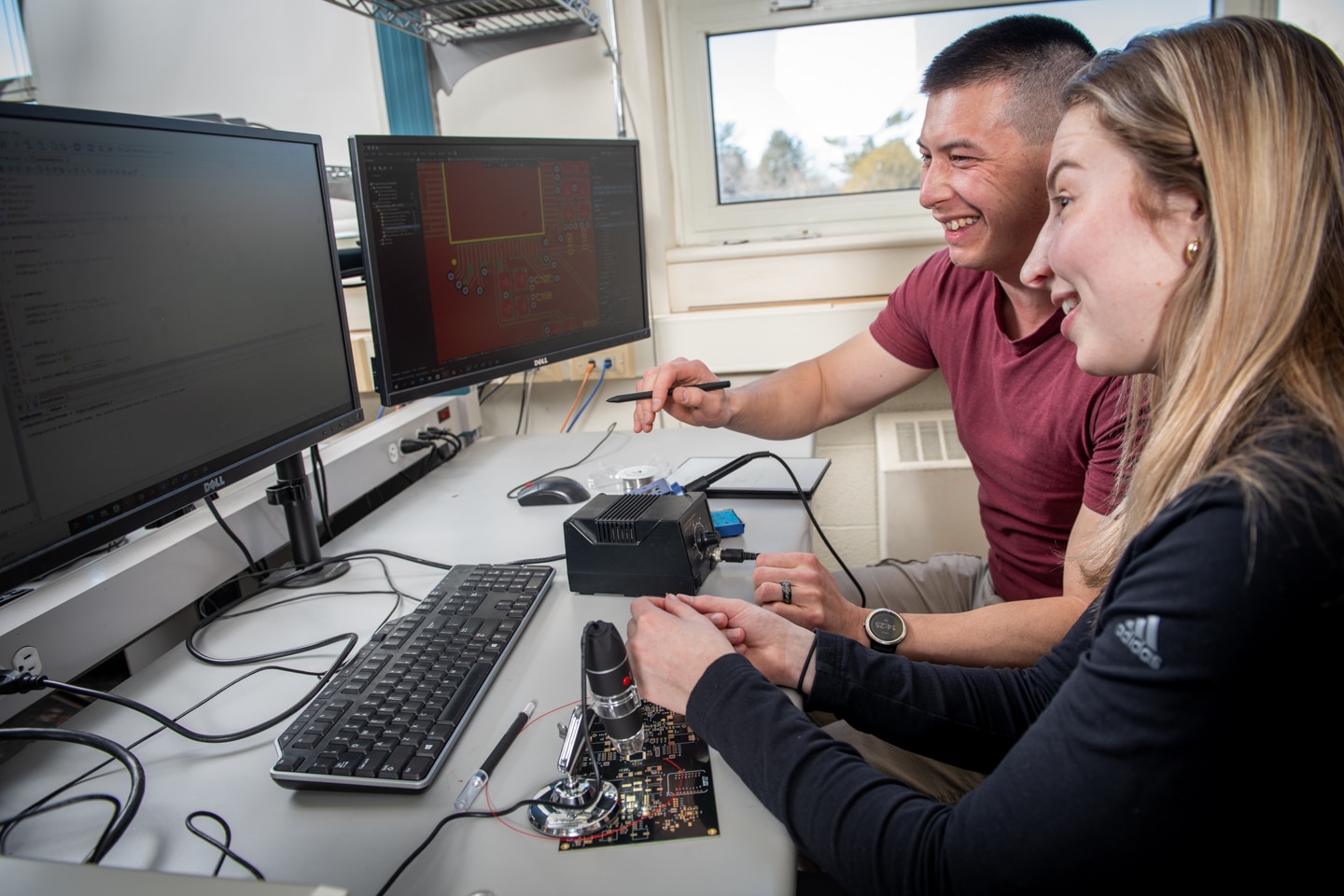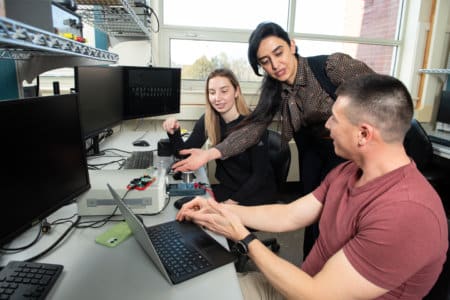From the moment we wake up to the time we rest our heads at night, it’s the discoveries and services of electrical and computer engineers that fuel our daily needs. Whether it’s navigating the best route to work, communicating with faraway loved ones or getting a crystal-clear snapshot of a winter sunset; these professionals remain at the forefront of creating seamless experiences in our interconnected world.
Those looking to make a similar impact will find everything they need and more at the University of New Brunswick‘s (UNB) Department of Electrical and Computer Engineering (ECE). This institution is a hotbed of cutting-edge research and a nurturing ground for the brilliant minds that will shape tomorrow. To feel empowered, students get involved. With each day spent witnessing and contributing to ground-breaking research, they become steps closer to achieving personal growth, professional development and societal impact.
Plenty can be found broadening their intellectual horizons in UNB’s Institute of Biomedical Engineering (IBME), which operates in partnership with the Department of Electrical and Computer Engineering. Students are central to its vision, mission and core values, hence why the institute is dedicated to providing them with comprehensive technical training in cutting-edge fields such as artificial intelligence, machine learning, statistics, and qualitative research methodology. It also prioritises the development of essential soft skills, such as communication, collaboration, and empathy.
With such impactful work being done within its walls daily, it’s easy to understand why students effortlessly grasp these key competencies. “The IBME has been instrumental in my academic journey,” says a student. “It has granted me invaluable opportunities to collaborate with world-renowned researchers, access cutting-edge technologies, and receive guidance from highly-qualified teachers and mentors.”

At UNB, researchers work closely with students to make world-bettering discoveries. Source: University of New Brunswick
As Canada’s first biomedical institute, the IBME is filled with experts. Over the past 50 years, they have garnered global recognition for their groundbreaking work in myoelectric control, significantly contributing to theoretical research, clinical translation, and commercialisation.
Building on this rich legacy, UNB has expanded its strengths over the last two decades to encompass a broader range of rehabilitation-focused endeavours. These include conducting international clinical trials of exoskeletons, and developing digital health technologies for gait and mobility assessment, which have resulted in the establishment of nationally-recognised spinoff companies and a Centre for Adaptive Rehabilitation Engineering.
The Emera & NB Power Research Centre for Smart Grid Technologies is operated by pioneers in the fields of renewable energy systems, optimal control of distributed energy resources, micro and nanogrids, vehicle to everything (V2X), wind forecasting, cybersecurity, big data and technology management, among others. Their supervision is crucial in helping students remain at the forefront of the smart grid revolution. In the process, they develop versatile, well-rounded skillsets needed to thrive in the modern energy sector and spearhead a more sustainable future.
UNB’s wireless power studies revolve around improving our world, too — specifically, by helping electric vehicles (EV) achieve clean transportation by innovating wireless EV charging. In the Silicon Thin Film Fabrication (STIFF) lab, students receive unique training in the design of all-silicon quantum light sources generating quantum bits.

UNB offers experiential learning opportunities to every faculty. Source: University of New Brunswick
Meanwhile, the CubeSat NB research group focuses on better understanding space weather, climate change and the relationship between our earth’s atmosphere and the sun. To accomplish this, students and faculty members collaborate on developing the small satellites needed to facilitate various research projects.
Joining an ECE program immediately unlocks access to these state-of-the-art spaces. The four-year undergraduate programs nurture the basics of engineering before allowing students to specialise in a discipline that complements their long-term aspirations. Those who want to advance their knowledge and skills can choose from three postgraduate routes: the research-based Master of Science in Engineering (MScE), the course-based Master of Engineering (MEng), or a Doctor of Philosophy (PhD). All routes promise an enriching journey, regardless of where students are from.
UNB specialises in helping students from abroad make successful transitions to life in Canada and ensuring they stay not just engaged but also have the best time of their life here. Currently home to over 800 international students, the university serves as a home away from home for those who come from near and far.
“My experience has been nothing short of extraordinary. The faculty members are not only experts in their fields but also approachable mentors who genuinely care about their students’ success,” attests an international student.
“Their guidance and support have been invaluable in shaping my academic trajectory. I am immensely grateful for the opportunity of being a graduate student at UNB and fervently recommend the graduate programs offered by UNB’s ECE department to international students looking for success and exciting career opportunities.”
Follow the University of New Brunswick on their Facebook, Twitter, YouTube and LinkedIn












